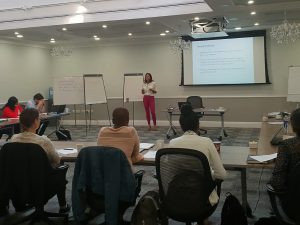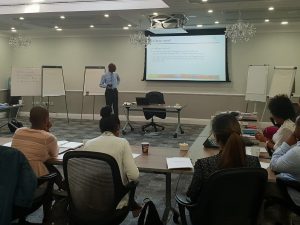News
First training session on the Ethics of Psychiatric Genomics
July 24th 2018
NeuroGenE delivered the ethics component of the Global Initiative for Neuropsychiatric Genetics Education in Research (GINGER) two-week training session in Hampshire as part of their curriculum on global neuropsychiatric genetics for 17 African GINGER Research Fellows. Ms. Mehret Efrem organised and led the training session with Professor Ilina Singh and Dr. Caesar Atuire providing lectures and facilitating ethical debates.
Professor Singh began the ethics training session with an overview of ethical principles and debates around neuropsychiatric genomics. She explained the history of ethical guidance in research, noting the Western lens of current research ethics. Following this, Dr. Caesar Atuire who is with the Oxford team for 6 weeks, shared his insight on the African perspectives in bioethics, discussing common traits of African cosmovisions, such as the understanding of material and spiritual matter, notions of causation, and communal decision making. Areas of bioethical concern in Africa were highlighted as health care, communo-cultural practices, consumerism and corruption, natural resources and the environment, and neo-colonialism. Within healthcare bioethics, Dr. Atuire explained how multiple streams of health care in the African setting imply different ethical visions, and he concluded by raising critical questions around the role of psychiatric genomics in African healthcare bioethics.

Professor Ilina Singh talking about the ethical issues in psychiatric genomics

Dr. Caesar Atuire talking about the African perspectives of bioethics
Case studies were given to Fellows to discuss, depicting real ethical issues that have arisen from the various scientific sites. These case studies were revolved around issues of capacity to consent, feedback of findings, autonomy, and broad consent. Vibrant debates explored the pragmatic level of these ethical issues, balancing the multiple ethical principles at play.
This ethics training session was delivered through our partnership with GINGER, a training and capacity-building platform committed to delivering a programme on global neuropsychiatric genetics to early-career researchers in selected African countries. Prior to the Hampshire training, GINGER also delivered a workshop in collaboration with Makerere University, Uganda, on research methods and analysis.
The team is grateful to our guest, Dr. Atuire for supporting NeuroGenE in the ethics training and providing such a vibrant and valuable talk.















